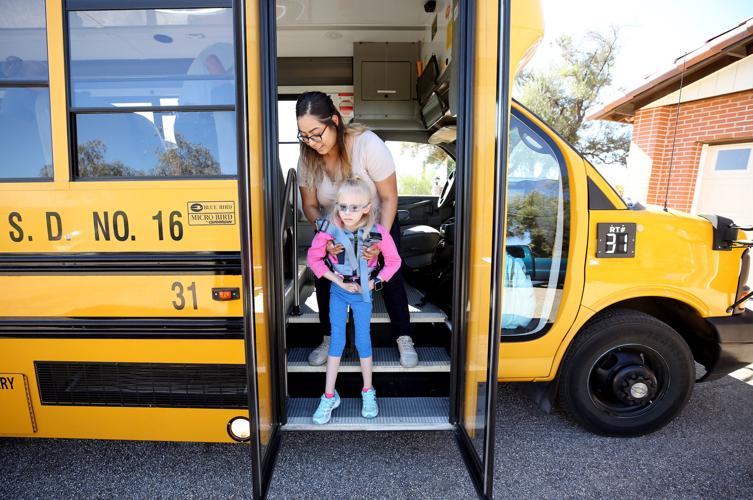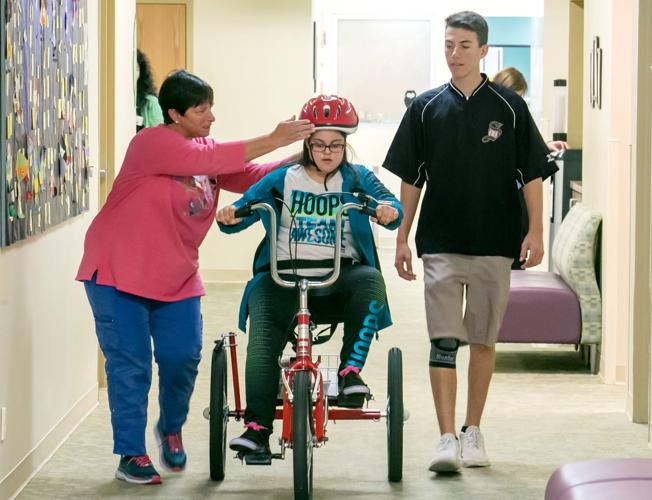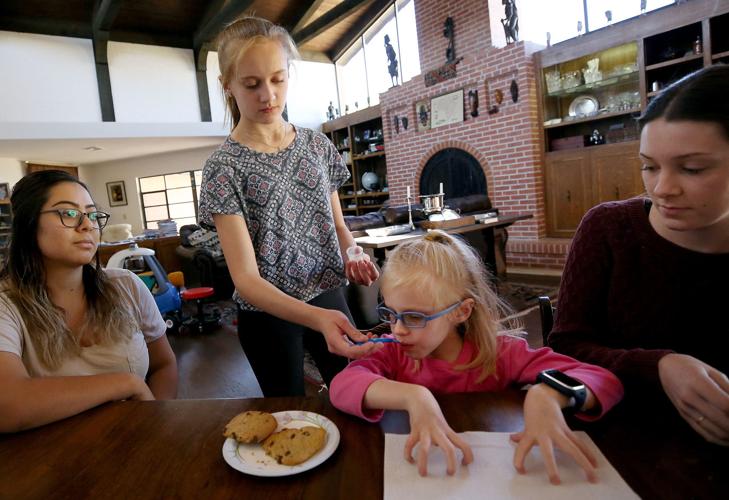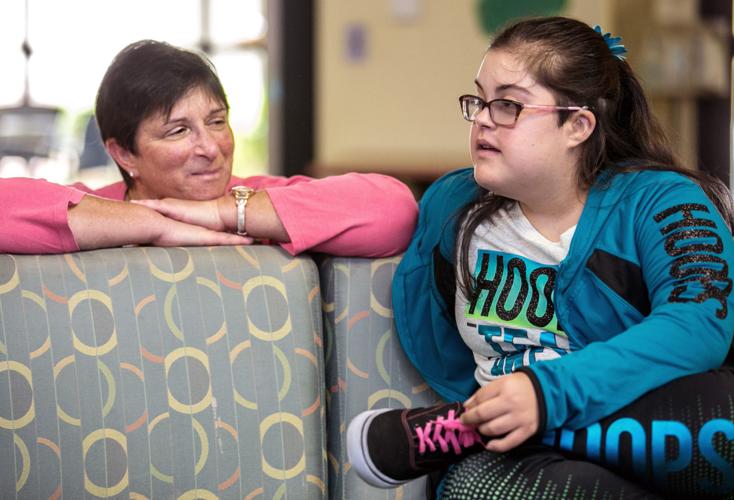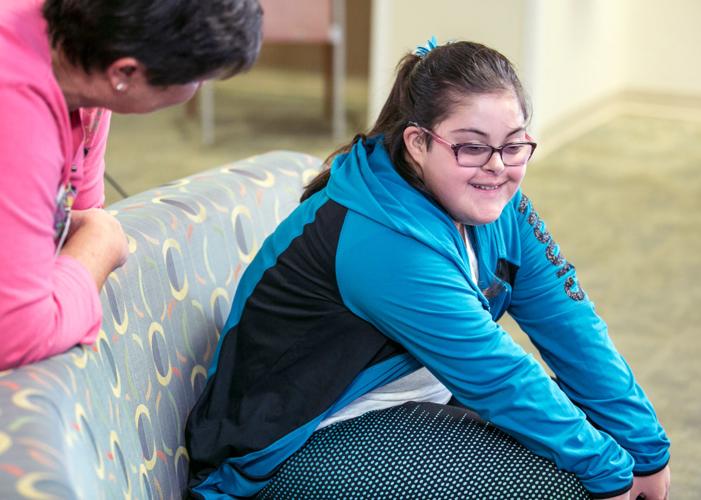Housing and services for people with developmental and intellectual disabilities have become harder to find and less affordable throughout Arizona, an “unintended consequence” of recent minimum-wage increases.
It’s left Tucson families worrying about finding help as in-home assistance and daytime programs become scarce, and group homes close or merge.
The Arizona minimum wage began increasing in 2017 from $8.05 to the current $10.50 per hour.
Since then, it’s become increasingly difficult for service agencies to attract and retain employees, said Mark G. Monson, chief executive officer of Tucson-based Community Provider of Enrichment Services.
Employees who leave are finding easier work elsewhere for the same pay.
“I think our workers deserve this money, don’t get me wrong,” Monson said of Proposition 206, or the Fair Wages and Healthy Families Act, approved by voters in November 2016, adding that the fallout was “an unintended consequence.” The problem, he said, is that publicly funded organizations like his can’t keep up now.
As it is, there’s little incentive for employees to stay in jobs that can be quite challenging and often include helping people with complex needs.
Families hope
for respite care
Tucson mother Mimi Rial would like to count on help for one of her four daughters, but said the turnover lately has been upsetting for everyone involved.
Rial’s husband travels frequently and also spends long days as a reservist at Davis-Monthan Air Force Base. Extra help is critical for their 6-year-old daughter, Bronwyn, who was born with cerebral palsy and developmental challenges.
The family qualifies through Arizona’s Long Term Care System (ALTCS) for respite hours, meaning help with their child so they can get some time away, and habilitation services, which entail a caregiver teaching Bronwyn basic skills such as bathing and dressing.
Bronwyn is highly susceptible to illness and sensitive to loud noises, her mother says, so it can be challenging to take her to public places. Their two older girls play volleyball, and that’s too noisy for Bronwyn, so help at home means Rial gets to see her other children play.
Another Tucson family gave up on using their respite-care funds from ALTCS for a while because no consistent help was available. They started again in September after Michelle Langan got a match for her daughter, Katie, through Donna Gallagher’s organization, Southern AZ Family Services.
Now Katie, who was born with Down syndrome and other medical challenges, enjoys greater independence thanks to her respite caregiver, Crystal Varelas.
The only downside, Langan said, is that Varelas’ help is in great demand and so she’s available for only a few hours each week.
Southern AZ Family Services has about 30 positions open because of low interest in the job, Gallagher said.
Respite care is the most sought-after service provided, she said, but her company is no longer offering it to new families and offers only small windows to longtime clients. She recently started a waiting list and has about 50 families on it.
Gallagher said most of the providers she knows have stopped offering respite. The only way she’s been able to continue is because she has some families who pay with their own money instead of through ALTCS, a Medicaid program designed for fixed-income seniors and people with disabilities who need help affording the care they need.
For Steven Freeman’s family, having a strong connection with a provider like Gallagher helped them through unexpected hardship when Freeman’s wife, Kathy, became very ill last year and was hospitalized for three months.
Gallagher called the state’s Division of Developmental Disabilities on Freeman’s behalf and was able to arrange for more help, including caregiver training for the family’s older daughter, Alexis, 23, who now cares for her sister, Dominique, 21, who has Down syndrome.
Freeman is grateful but said he knows through his years of volunteer work that they were fortunate.
“Something has to change,” said Freeman, past president of the Southern Arizona Network for Down Syndrome and a board member for the National Down Syndrome Society. “These providers are not going to be able to survive, and when that happens, families like ours are going to be hurting very, very badly.”
Reimbursements
aren’t keeping up
Arizona became nationally recognized for its approach to helping people with developmental and cognitive disabilities in the mid-1980s, when the focus became getting people out of institutional settings.
Former U.S. Rep. Ron Barber, then head of the state’s Division of Developmental Disabilities, said that shift led to more emphasis on in-home help, respite services and daily support for people to live either at home or in small supported residential settings.
Barber, who remains passionate about supporting people with disabilities, worries about what can go wrong when staffing levels get too low.
“This is some of the most important and challenging work,” he said. “We have to find an ongoing level of funding that’s at least higher than what people are being paid in fast-food joints.”
About 80 percent of the government-provided services for people with developmental and intellectual disabilities are paid for through federal Medicaid dollars, with states providing a match.
The state’s Division of Developmental Disabilities adopts provider rates based on a study that’s conducted every five years, said Brett Bezio, public information officer with the Arizona Department of Economic Security.
The next survey is getting underway, but since one hasn’t been undertaken since Proposition 206 took effect 15 months ago, providers were instead asked to submit quarterly surveys on how the minimum-wage increases are affecting them.
Providers, in turn, received an additional one-time payment to help cover costs, a total of $10 million from the state with $23 million in federal matching funds, split each quarter among up to 200 providers.
The one-time payment was useful, many providers agree, but it did not help them improve employee retention or offset turnover because it was not enough to increase wages. Many used it for employee bonuses instead or to cover operating costs.
Gov. Doug Ducey’s proposed state budget for fiscal year 2019 includes another $3.6 million in funding to address the ongoing minimum wage increases, said Elizabeth Berry, a spokeswoman for the governor, as well as restoring more of the funding that was cut, starting in 2009, during the Great Recession.
Reimbursement rates from the state have increased by 11 percent since early 2017. But that does not come close to covering the 31 percent cost increase providers have averaged since Proposition 206, said Rachelle Hadland, spokeswoman for the Arizona Association of Providers for People with Disabilities.
Providers currently have enough money to pay, on average, 2.7 percent above minimum wage, she said. Before Prop. 206, they were averaging about 16.5 percent above minimum wage.
Group homes closing
As of the end of January, nine or more group homes had closed statewide since early 2017, including three in Tucson, and at least seven employment programs were also eliminated.
That means people with intellectual or developmental disabilities who were previously working are now staying home, and that families who need help during the day are competing for space in thinly resourced programs.
The problem is leading to some of the highest employee turnover rates providers have seen.
From 2008-2010, for example, Community Provider of Enrichment Services (CPES) had a turnover rate of about 32 percent, but since the wage increase, it’s jumped to about 51 percent.
A similar but smaller organization, the Tucson Residence Foundation, also saw a turnover rate of about 32 percent during those recession years and is now seeing rates around 48 percent.
“My big concern is what happens the next year, when the minimum wage goes up again,” said CPES’s Monson. “If we don’t have the right workforce, who is going to care for these individuals?”
Under the voter-passed measure, the minimum wage is scheduled to go up to $11 per hour next year and to $12 in 2020.
The amount of funding Monson’s organization received for services in 2008 from the Department of Economic Security and the Division for Developmental Disabilities was $30.6 million. In 2017, it was $29.3 million.
To offset costs, CPES is reducing benefits. The situation is particularly bad in Flagstaff, Monson said, where the minimum wage is $15.50 per hour under a local ordinance. The agency is closing or transitioning people out of three group homes there, and anticipates closing two to four more in the Phoenix area .
The Tucson Residence Foundation, which closed one group home in 2017 and anticipates closing another one this year, now operates 16 group homes and 31 supported-living facilities in Southern Arizona.
In order to keep helping longtime residents, CEO Bob Bennetti said the foundation is subsidizing low reimbursement rates through a “self-determination fund,” which the foundation started and replenishes through fundraising and donations.
Achieve Builds Confidence is a smaller Tucson provider that’s had to consolidate programs to reduce costs, said Charlotte Higdon, the executive director. She said about five employees have left since January, and she expects that number will soon be 10.
The company received a 1.5 percent reimbursement increase in 2017 and a 3 percent increase in 2018, said its chief financial officer, Tim Higdon.
“This does not cover the cost due to Prop. 206. Wages are 80 percent of our cost,” he said.
The Jewish Community Center, at 3800 E. River Road, has a young-adult day program and a summer camp. It helps children ages 3 and older, as well as young adults up to age 22, including services for those living with developmental and physical disabilities.
Emily Malin, director of special-needs services for the JCC, voted for the wage increase, which helps her employees, including Travis Fischer, who has worked for the program since 2010.
Fischer says the work is its own reward, but his boss would like to see him better-compensated.
“I am in favor of providing staff a fair wage for their work,” Malin said. “However, I believe the DDD then needs to provide a fair reimbursement rate.”


